International Women's Day – Saturday 8 March 2025
Friday, March 7, 2025
By Paul Whitelock
 International Women's Day is celebrated annually on 8 March as a focal point in the women’s rights movement. IWD gives focus to issues such as gender equality, reproductive rights, and violence and abuse against women. International Women's Day is celebrated annually on 8 March as a focal point in the women’s rights movement. IWD gives focus to issues such as gender equality, reproductive rights, and violence and abuse against women.
This important day will be celebrated throughout the world, tomorrow, Saturday.
Origins
Spurred on 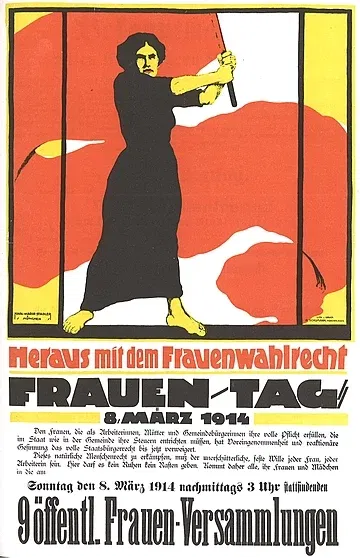 by the universal female suffrage movement, IWD originated from labour movements in North America and Europe during the early 20th century. by the universal female suffrage movement, IWD originated from labour movements in North America and Europe during the early 20th century.
The earliest version reported was a "Women’s Day" organised by the Socialist Party of America in New York City on 28 February, 1909.
This inspired German delegates at the 1910 International Socialist Women’s Conference to propose "a special Women's Day" be organised annually.
The following year, 1911, saw the first demonstrations and commemorations of International Women's Day across Europe.
Development
After the Russian Revolution in 1917, IWD was made a national holiday on March 8; it was subsequently celebrated on that date by the socialist movement and communist countries.
To start with the holiday was associated with far-left movements and governments until its adoption by the global feminist movement in the late 1960s.
IWD became a mainstream global holiday following its promotion by the United Nations in 1977.
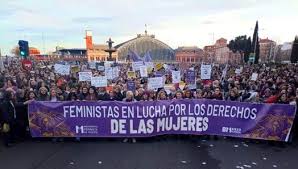 International Women's Day is a public holiday in several countries. The UN observes the holiday in connection with a particular issue, campaign, or theme in women's rights. International Women's Day is a public holiday in several countries. The UN observes the holiday in connection with a particular issue, campaign, or theme in women's rights.
Whilst IWD is not an official holiday in most countries of Europe, it is celebrated nonetheless.
Several countries, including Uruguay, Spain, Italy, France and Algeria, have squares or other public spaces named after 8 March in reference to International Women's Day.
International Women’s Day 2025
The theme for 2025 is: “Her Rights, Our Future, Right Now”, and the campaign theme is; “Accelerate Action”.
In the British House of Commons yesterday MP Jess Phillips, Parlia mentary Under-Secretary of State for Safeguarding and Violence Against Women and Girls in the “newish” Labour government, read out the names of the British women who had been murdered by men in 2024. mentary Under-Secretary of State for Safeguarding and Violence Against Women and Girls in the “newish” Labour government, read out the names of the British women who had been murdered by men in 2024.
There were 95 names – a shocking figure.
Phillips also mentioned other female deaths where the perpetrator has not been convicted .....
..... and also a number of suicides by abused women and girls.
Watch her speech here:
Jess Phillips MP – lists the 95 women killed by men, or where the suspect is a man – March 2025
Note:
 This is the 10th year in succession that Jess Phillips has read out the names of those killed in the preceding year. This is the 10th year in succession that Jess Phillips has read out the names of those killed in the preceding year.
However, this was the first time that she was able to do so from the despatch box, and not from the back benches as a spokesperson for the opposition.
Epilogue
 Whilst IWD is about the positive side of women’s place in society, it is important to be reminded that there is still a lot of work to be done. Whilst IWD is about the positive side of women’s place in society, it is important to be reminded that there is still a lot of work to be done.
Links:
International Women's Day - 8 March 2024 - Help me, Ronda
International Women's Day - 8 March - Secret Serrania de Ronda
International Women’s Day: Spanish Health Minister announces new measures to ensure equal abortion rights - Olive Press News Spain
© The History Man
With thanks to:
 Wikipedia for information and most photos Wikipedia for information and most photos
Youtube for the video
Other photos courtesy of BBC, IWD, Facebook, Freepik
Tags:
8 March, abuse against women, BBC, communist, Facebook, feminist, FILIA, Freepik, gender equality, female suffrage, IWD, International Socialist Women’s Conference, International Women's Day, Invest in Women, Paul Whitelock, reproductive rights, Russian Revolution, socialist, Socialist Party of America, United Nations, violence, Wikipedia, "Women’s Day", women's rights, Youtube
 0
Like
Published at 12:03 PM Comments (0)
0
Like
Published at 12:03 PM Comments (0)
DIA DE ANDALUCIA 2025 - 28 February
Friday, February 28, 2025
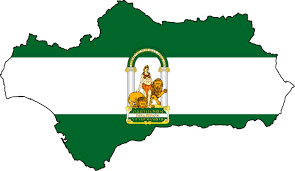 It is 45 years since 28 February 1980 when in a referendum the andaluces voted overwhelmingly for their region to become one of Spain’s 17 autonomous regions (federal states), following Spain’s return to democracy on the death of the dictator General Franco five years earlier. It is 45 years since 28 February 1980 when in a referendum the andaluces voted overwhelmingly for their region to become one of Spain’s 17 autonomous regions (federal states), following Spain’s return to democracy on the death of the dictator General Franco five years earlier.
Bandera andaluza [courtesy of saedyn]
Friday 28 February 2025
Today is a día festivo in Andalucía, a holiday of obligation. Everywhere is closed, except for bars and restaurants, bakers, newsagents and, of course, churches, so that all good Roman Catholics may go to Mass.
 Bad weather, including warnings of heavy rain and thunderstorms, was forecast and, sure enough, as I write this, I can hear the heavy downpour and prolonged thunderclaps outside. Bad weather, including warnings of heavy rain and thunderstorms, was forecast and, sure enough, as I write this, I can hear the heavy downpour and prolonged thunderclaps outside.
Sadly, the bad weather will curtail some of the outdoor celebrations. Never mind, the andaluces will still enjoy the extra-long weekend, by celebrating with family and friends.
Bad weather [Posters.es]
And the "guiris"?
Many of us foreigners who are resident here will also use the excuse to celebrate this important day in the political and cultural history of the region.
 As for me and the Meter Maid, we’re heading off on foot to the nearest restaurant to our home, the excellent La Cascada at the Hotel Molino del Puente, just outside Ronda. As for me and the Meter Maid, we’re heading off on foot to the nearest restaurant to our home, the excellent La Cascada at the Hotel Molino del Puente, just outside Ronda.
No driving anywhere today – the local guardia civil will be out in force hoping to catch drink-drivers.
The terrace at La Cascada [Photo: Ian Love]
***
UPDATE:
We enjoyed our meal at La Cascada. To read my review please click here:
DIA DE ANDALUCIA DINING 2025
***
Further reading:
FORGOTTEN ANNIVERSARY: Spain's General Franco died 45 years ago
Andalucía Day (Día de Andalucía) - Secret Serrania de Ronda - 2021
Día de Andalucía – Monday 28 February 2022
My Andalucia Day - a personal serendipity – 2023
Back to the “Bridge” – St George’s Day
Por qué se celebra el 28-F el día de Andalucía Franco lies in state [Daily Mail]
What is a guiri? - Olive Press News Spain The OP has a paywall so you may not get to read the article. Try here instead for a similar article:
What is a guiri? It's what the Spanish call us foreigners - but is it good or bad?
© The History Man
Photos:
Daily Mail, Ian Love, Karl Smallman, Paul Whitelock, Posters.es, saedyn,
Acknowledgements:
Eye on Spain, Ian Love, Karl Smallman, Paul Whitelock, RTVE, Secret Serranía, The Olive Press
Tags:
17 autonomous regions, 28 February 1980, andaluces, Andalucía, bad weather, celebrating with family and friends, Daily Mail, death of the dictator General Franco, democracy, día festivo, drink-drivers, extra-long weekend, Eye on Spain, foreigners, guardia civil, guiri, heavy downpour, heavy rain, holiday of obligation, Hotel Molino del Puente, Ian Love, Karl Smallman, La Cascada, Mass, Meter Maid, outdoor celebrations, Paul Whitelock, political and cultural history of the region, RTVE, referendum, resident, Roman Catholics, Ronda, saedyn, Secret Serranía, The History Man, The Olive Press, thunderclaps, thunderstorms,
áéíóú
 0
Like
Published at 3:12 PM Comments (0)
0
Like
Published at 3:12 PM Comments (0)
The Worst Day in British History - 5 years on
Saturday, February 1, 2025
The worst day in British history?
Forget 1066 and the Norman Invasion. Forget the Great Plague and the Great Fire of London. Forget also Oliver Cromwell, the murder of Thomas Beckett, the reign of Henry VIII, the First World War, World War II and the Holocaust.
I wasn’t around to witness those events.
 For me the worst day in British History was 23 June 2016 when the UK voted to leave the European Union. Based on lies promoted by Nigel Farage, then leader of UKIP, and Bojo The Clown, alias Boris Johnson. For me the worst day in British History was 23 June 2016 when the UK voted to leave the European Union. Based on lies promoted by Nigel Farage, then leader of UKIP, and Bojo The Clown, alias Boris Johnson.
[Image courtesy of Dachser]
To actually leave took another four years of flawed negotiation by Johnson, the now discredited former prime minister.
 
Nigel Farage [Photo: Times Higher Education] Boris Johnson [Photo: Heraldo de Aragón]
31 January, 2020
 Five years ago on this day was the date of Brexit, the day the UK actually left the European Union. The referendum had taken place just less than four years earlier and was arguably the worst day of my life. Five years ago on this day was the date of Brexit, the day the UK actually left the European Union. The referendum had taken place just less than four years earlier and was arguably the worst day of my life.
I stayed up all night to watch the results coming in. From a bright beginning, the first result to be declared was Gibraltar, the British protectorate off southern Spain. 98 per cent voted to remain.
It got worse from then on.
[Image courtesy of ANPE Cantabria]
In the end the vote was: Yes 51.9%; No 48.1%
Abandonar la Unión Europea 17 410 742 51.9 %
Permanecer en la Unión Europea 16 141 241 48.1 %
Votos válidos 33 551 983 99.9 %
Votos no válidos o en blanco 26 033 0.1 %
Participación 33 578 016 72.2 %
Votantes registrados 46 501 241 100.00 %
Fuente: BBC
Sense of loss
As a languages student, I travelled more often to the continent than within my home country.
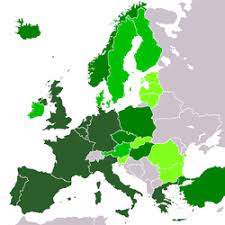 I got to know France, Germany and Spain particularly well, but also visited Austria, Belgium, the Czech Republic, Denmark, Greece, Ireland, Luxembourg, the Netherlands, Norway, Portugal, the Soviet Union and Sweden. I got to know France, Germany and Spain particularly well, but also visited Austria, Belgium, the Czech Republic, Denmark, Greece, Ireland, Luxembourg, the Netherlands, Norway, Portugal, the Soviet Union and Sweden.
So, I was a true European and, when it came to the referendum, I was a committed remainer, following prime minister David Cameron’s ill-fated decision to offer the British population a vote on the issue.
Although I am not a Conservative, I liked Cameron until he spoiled his legacy with this huge faux pas.
Map of Europe [Wikipedia]
Five years on
 And where did Brexit leave us? And where did Brexit leave us?
“Up shit creek without a paddle”.
I find it a terrible shame that the Labour Party did not commit to re-joining the European Union or at least the Customs Union.
This has left the UK adrift between the huge European bloc of 27 countries and the pariah of a country that the USA is destined to become under president Donald J Trump, a convicted felon and all-round bad guy.
[Cartoon courtesy of Reddit]
© The History Man

[Image courtesy of El Periódico]
Acknowledgements:
ANPE Cantabria, BBC, Dachser, El Periódico, Heraldo de Aragón, Reddit, Sky News, Times Higher Education (THE), Wikipedia
Tags:
1066, 23 June 2016, 31 January 2020, ANPE Cantabria, Austria, bad guy, Belgium, Bojo The Clown, Boris Johnson, Brexit, BBC, Conservative, convicted felon, Customs Union. Czech Republic, Dachser, David Cameron, Denmark, discredited former prime minister, Donald J Trump, El Periódico, European, European bloc of 27 countries, European Union, faux pas, First World War, France, Germany, Gibraltar, Great Fire of London, Great Plague, Greece, Henry VIII, Heraldo de Aragón, History Man, Holocaust, Ireland, Labour Party, leave the European Union, Luxembourg, murder of Thomas Beckett, Norman Invasion, Netherlands, Norway, Oliver Cromwell, pariah, Portugal, Reddit, referendum, re-joining the European Union, remainer, Sky News, Soviet Union, Spain, spoiled his legacy, Sweden, THE, Times Higher Education, “Up shit creek without a paddle”, UK, USA, Wikipedia, World War II, worst day in British History,
áéíóúü
 4
Like
Published at 1:33 AM Comments (2)
4
Like
Published at 1:33 AM Comments (2)
230,000 dead after massive flooding
Saturday, December 28, 2024
It was 20 years ago yesterday, Boxing Day, that a massive tsunami devasted communities along the surrounding coasts of the Indian Ocean, killing an estimated 227,898 people in 14 countries.
The countries whose coastal areas were affected included India, Indonesia, Maldives, Pakistan, Sri Lanka, Sumatra, and Thailand. The wave even reached the east coast of Africa.
The tsunami and its aftermath were responsible for immense destruction and loss of life on the rim of the Indian Ocean.
Factfile
On 26 December 2004, at 07:58:53 local time, a major earthquake, measuring a massive 9.2–9.3 on the Richter scale, struck with an epicentre off the west coast of Aceh in northern Sumatra, Indonesia.
The undersea earthquake was caused by a rupture along the fault between the Burma plate and the Indian plate.
 The direct results of this huge tsunami with waves up to 30 m (100 ft) high, caused major disruptions to living conditions and commerce in coastal provinces of surrounding countries. The direct results of this huge tsunami with waves up to 30 m (100 ft) high, caused major disruptions to living conditions and commerce in coastal provinces of surrounding countries.
It is the deadliest natural disaster of the 21st century, one of the deadliest natural disasters in recorded history, and the worst tsunami disaster in history.
It is also the worst natural disaster in the history of Indonesia, Maldives, Sri Lanka and Thailand. It was the most powerful earthquake ever recorded in Asia, the most powerful earthquake in the 21st century, and at least the third most powerful earthquake ever recorded in the world since modern seismography began in 1900.
It had the longest fault rupture ever observed, between 1,200 km and 1,300 km and had the longest duration of faulting ever observed, at least ten minutes. It caused the planet to vibrate as much as 10 mm (0.4 in), and also remotely triggered earthquakes as far away as Alaska.
Its epicentre was between Simeulue and mainland Sumatra. The plight of the affected people and countries prompted a worldwide humanitarian response, with donations totalling more than US$14 billion.
20 years on

The recovery of these communities has been amazing. Obviously, the shock and grief experienced two decades ago is still ever present in the hearts and minds of survivors and the bereaved.
On this 20th anniversary the media has “gone to town”, interviewing survivors, including locals and foreigners who were there on holiday, and illustrating how they have processed what happened and how they have coped with the loss of loved ones. Many have involved themselves in charity work and continue to support the communities affected.
“The Impossible” (feature film)
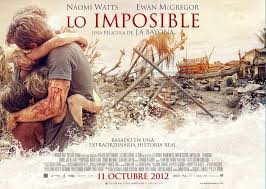 Eight years after the tragedy a remarkable film was released by Warner Bros. The English language-Spanish collaboration “Lo Imposible” was directed by Juan Antonio García Bayona and written by Sergio Gutiérrez Sánchez two Spanish film-makers in their 40s. Eight years after the tragedy a remarkable film was released by Warner Bros. The English language-Spanish collaboration “Lo Imposible” was directed by Juan Antonio García Bayona and written by Sergio Gutiérrez Sánchez two Spanish film-makers in their 40s.
The film featured international actors, including Naomi Watts, Ewan McGregor, Tom Holland, Geraldine Chaplin, Marta Etura, Sönke Möhring, Douglas Johansson and Emilio Riccardi.
The film was well-received by critics and received numerous nominations and awards, including Oscars, Golden Globes and from the Screen Actors Guild.
  
Naomi Watts [Aventura y Naturaleza] [Photo: 20Minutos] The cast at an Award Ceremony [El Diario]
You can watch the entire film in English here: The impossible full movie 1080 Blueray print
© The Culture Vulture/The History Man
Links:
The Impossible (2012 film) - Wikipedia
The impossible full movie 1080 Blueray print
Photos:
20Minutos, Aventura y Naturaleza, BBC News, El Diario, Muy Interesante, Wikipedia, WordPress
Acknowledgements:
Wikipedia, www.bing.com, www.britannica.com, www.premiososcar.net
Tags:
14 countries, 20 years on, 21st century, 227,898 people, Alaska, Boxing Day, Douglas Johansson, earthquake, east coast of Africa, Emilio Riccardi, Ewan McGregor, Geraldine Chaplin, India, Indian Ocean, Indonesia, Juan Antonio García Bayona, “Lo Imposible”, Maldives, Marta Etura, Naomi Watts, Pakistan, Richter scale, seismography, Sergio Gutiérrez Sánchez, Simeulue, Sönke Möhring, Sri Lanka, Sumatra, Thailand, The Culture Vulture, The History Man, "The Impossible", third most powerful earthquake ever recorded in the world, Tom Holland, tsunami, Wikipedia
 0
Like
Published at 10:11 AM Comments (1)
0
Like
Published at 10:11 AM Comments (1)
8 December – Inmaculada Concepción
Sunday, December 8, 2024
 Today celebrates the immaculate conception of the Virgin Mary, mother of Jesus Christ, Son of God. Today celebrates the immaculate conception of the Virgin Mary, mother of Jesus Christ, Son of God.
Christians the world over consider today to be one of the most important days in the religious calendar. In many Roman Catholic countries, it is an official “feast day”.
[Image courtesy of Freepik]
Designation as public holiday

[Image courtesy of Reddit]
8 December is a registered public holiday in the following sovereign countries and territories:
“Puente”
 If a “national holiday” falls on a Sunday, the regional governments — the autonomous communities of Spain — can choose an alternate holiday, or they can allow local authorities to choose. If a “national holiday” falls on a Sunday, the regional governments — the autonomous communities of Spain — can choose an alternate holiday, or they can allow local authorities to choose.
A “Puente” (bridge) is sometimes made between weekends and holidays that fall on Tuesday or Thursday. The “Puente” will then create a long weekend.
In 2024, 8 December falls on a Sunday, today, as a result of which Monday 9 December is also a “día festivo”.
[Image courtesy of La Sexta]
 Which is why banks, schools, universities, medical centres, government and council offices and many shops and businesses closed their doors last Thursday and won’t re-open them until next Tuesday! Which is why banks, schools, universities, medical centres, government and council offices and many shops and businesses closed their doors last Thursday and won’t re-open them until next Tuesday!
Spanish-owned stores, such as Mercadona and Día remain closed on religious days.
It is noticeable, however, that foreign-owned supermarkets and DIY stores, such as Aldi, LIDL and Bauhaus, German; Al Campo, Carrefour, Supeco, Leroy Merlin and Conforama, all French; IKEA, Swedish; and JYSK, Danish, open as normal.
[Image courtesy of LinkedIn]
© The History Man
Acknowledgements:
Encyclopaedia Britannica
Secret Serranía
Wikipedia
Images:
Freepik
La Sexta
LinkedIn
Reddit
Tags:
8 December, Al Campo, Aldi, banks, Bauhaus, businesses, Carrefour, Conforama, Día, “día festivo”, DIY stores, foreign-owned supermarkets, Freepik, government and council offices, History Man, IKEA, immaculate conception, Inmaculada Concepción, JYSK, La Sexta, Leroy Merlin, LIDL, LinkedIn, medical centres, Mercadona, national holiday, “Puente”, Reddit, schools, Secret Serranía, shops, Spanish-owned stores, Supeco, universities, Virgin Mary, Wikipedia, áéíóúü
 1
Like
Published at 5:45 AM Comments (0)
1
Like
Published at 5:45 AM Comments (0)
Día de la Constitución – what a disappointment!
Friday, December 6, 2024
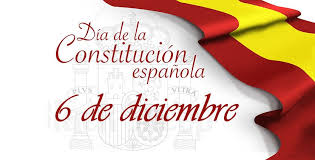 One of the most significant días festivos in Spain – in fact a national holiday – appears to be of little importance to the Spaniards where I live in Andalucía. One of the most significant días festivos in Spain – in fact a national holiday – appears to be of little importance to the Spaniards where I live in Andalucía.
As I write this at 19.30 on the day itself in my local bar, there is nobody about!
I’ve spoken to a few of my Spanish neighbours, and today is not important for them. They’re just glad to have a day off!
Why is it not important?
Día de la Constitución
 Today is a celebration of Spain emerging from the Franco dictatorship and becoming a fully-fledged democratic country for the first time since 1936, more than 80 years ago! Today is a celebration of Spain emerging from the Franco dictatorship and becoming a fully-fledged democratic country for the first time since 1936, more than 80 years ago!
But here I sit, in my local and there’s nobody about!
***
Wait! It’s 19.40 and a bunch of Spanish hotel guests have just arrived in the bar.
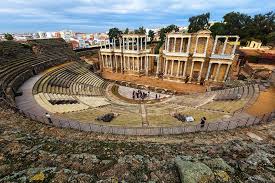 I’ve just spent 20 minutes talking to them. They’re from Merida in Extremadura, my second-favourite region in Spain, and they understand the significance of today. BTW, there are 40 of them from a walking group (senderistas). I’ve just spent 20 minutes talking to them. They’re from Merida in Extremadura, my second-favourite region in Spain, and they understand the significance of today. BTW, there are 40 of them from a walking group (senderistas).
For me, as a foreigner, who has experienced Spain since Franco, the golpe de estado in 1980, the economic crash in 2008 and the Covid-19 pandemic, and the current resurgence of the Spanish economy, I think that today is a very important day in the modern history of Spain.
But, that’s just me!
The locals seem only to be interested in a day off!
© The Travel Guru
Links:
Fortieth anniversary of Spain's failed coup - Secret Serrania de Ronda
Journey to the hard extreme - Extremadura - Part 1
Extremadura – Journey to the hard extreme – Part 2 - 2021
Acknowledgements:
RTVE
Sitios de España
Tags:
Andalucía, Covid-19 pandemic, Día de la Constitución, día festivo, economic crash, Extremadura, foreigner, Franco dictatorship, golpe de estado in 1980, Merida, national holiday, RTVE, resurgence of the Spanish economy, Sitios de España, Travel Guru
 0
Like
Published at 8:58 PM Comments (0)
0
Like
Published at 8:58 PM Comments (0)
Spain’s General Franco died 49 years ago
Tuesday, November 19, 2024
By The History Man
 Tomorrow, November 20, is the 49th anniversary of the death of Spanish dictator General Franco. The History Man remembers the day Franco died in 1975 and writes a short history of the man who outlived by three decades his fascist contemporaries, Adolf Hitler and Benito Mussolini. Tomorrow, November 20, is the 49th anniversary of the death of Spanish dictator General Franco. The History Man remembers the day Franco died in 1975 and writes a short history of the man who outlived by three decades his fascist contemporaries, Adolf Hitler and Benito Mussolini.
General Franco is laid to rest [Photo: Daily Mail]
How I found out
In November 1975 I was a young teacher in Cheshire in the North West of England. I was in my second year of teaching Spanish. One Thursday Vicente, our somewhat dour Spanish assistant, rushed into the staff room, all smiles and talking excitedly in his native tongue. “El sinverguenza ha fallecido por fin" ("The bastard’s dead at last!”) he cried in Spanish. “Who’s dead?” I asked.
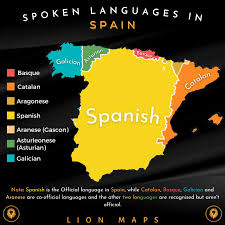 Generalísimo Franco, Spain’s dictator for almost 40 years, had finally passed away after a lengthy illness. Vicent, as he became at a stroke, was thrilled to bits. Apart from all the atrocities that could be laid at Franco’s door, he had for forty years repressed the linguistic minorities in Spain. The Basques, the Catalans and the Galicians were forbidden to use their native languages euskera, catalán and gallego. So, also the Valencians. Vicent was a valenciano, so from that November day on he decided he would be known by his nombre valenciano, Vicent. Generalísimo Franco, Spain’s dictator for almost 40 years, had finally passed away after a lengthy illness. Vicent, as he became at a stroke, was thrilled to bits. Apart from all the atrocities that could be laid at Franco’s door, he had for forty years repressed the linguistic minorities in Spain. The Basques, the Catalans and the Galicians were forbidden to use their native languages euskera, catalán and gallego. So, also the Valencians. Vicent was a valenciano, so from that November day on he decided he would be known by his nombre valenciano, Vicent.
This policy of linguistic repression was somewhat odd, given that Francisco Franco Bahamonde was a gallego, born in El Ferrol in Galicia in 1892 into an upper-class military family.
Languages of Spain [Image courtesy of Reddit]
Franco's early career
Franco enrolled in the Spanish Army as a cadet and rose quickly through the ranks to become brigadier general aged 33, the youngest general in Spain.
After leading the suppression of the 1934 uprising in Asturias, Franco was briefly elevated to Chief of Army Staff before the 1936 election moved the leftist Popular Front into power, relegating him to the Canary Islands. After initial reluctance, he joined the July 1936 military coup which sparked the Spanish Civil War.
During the civil war, he commandeered Spain’s colonial army in Africa and, after the deaths of many of the rebel leadership, became his faction’s only leader, later appointed Generalísimo and Head of State in 1936.
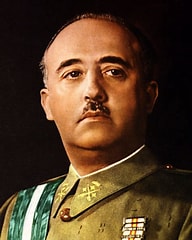 Three years later the Guerra Civil ended when the nationalists declared victory which extended Franco’s dictatorship over Spain through a period of repression of political opponents. His dictatorship’s use of forced labour, concentration camps, and executions led to between 30,000 and 50,000 deaths after the war. Combined with wartime killings, this brings the death toll of the so-called “White Terror” to between 100,000 and 200,000. Three years later the Guerra Civil ended when the nationalists declared victory which extended Franco’s dictatorship over Spain through a period of repression of political opponents. His dictatorship’s use of forced labour, concentration camps, and executions led to between 30,000 and 50,000 deaths after the war. Combined with wartime killings, this brings the death toll of the so-called “White Terror” to between 100,000 and 200,000.
In post-Civil-War Spain, Franco ruled with more power than any Spanish leader before or since, and developed a cult of personality around his rule by founding the Movimiento Nacional. During World War II he maintained Spanish neutrality but supported the Axis, whose members Italy and Germany had supported him during the Civil War, in various ways, thereby damaging the country’s international reputation.
[Photo courtesy of Wikipedia]
Franco as Spanish dictator
During the start of the Cold War, Franco lifted Spain out of its mid-20th century economic depression through technocratic and economically liberal policies, presiding over a period of rampant growth known as the “Spanish miracle”.
Franco started struggling with Parkinson’s disease in the 1960s. Owing to advanced age and illness, in 1973 he resigned as prime minister, separated from the head of state office since 1967, but remained in power as the head of state and commander-in-chief of the military.
 Always a monarchist, Franco had restored the monarchy in his final years, by nominating Juan Carlos de Borbón as his successor to the role of head of state. Always a monarchist, Franco had restored the monarchy in his final years, by nominating Juan Carlos de Borbón as his successor to the role of head of state.
Two days after his death, Juan Carlos became King of Spain, and led the Spanish transition to democracy.
Juan Carlos with Franco [Libertad Digital]
Spain post-Franco
The legacy of Franco in Spanish history remains controversial as the nature of his dictatorship changed over time. His reign was marked by both brutal repression, with thousands killed, and economic prosperity, which greatly improved the quality of life in Spain.
His dictatorial style proved highly adaptable, which enabled wide-sweeping social and economic reform, while consistent pursuits during his reign centred on highly centralised government, authoritarianism, nationalism, national Catholicism, anti-freemasonry, and anti-communism.
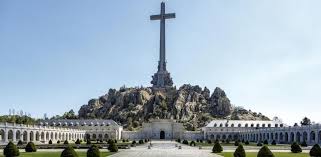 Franco was controversially buried in the Valle de los Caídos (Valley of the Fallen), the huge mausoleum outside Madrid he had built by the forced labour of political prisoners to honour the dead of both sides in the Civil War. He was the only person interred there who did not die during the conflict. Franco was controversially buried in the Valle de los Caídos (Valley of the Fallen), the huge mausoleum outside Madrid he had built by the forced labour of political prisoners to honour the dead of both sides in the Civil War. He was the only person interred there who did not die during the conflict.
After much campaigning, in October 2019 Franco’s remains were removed from the Valley and reburied alongside his wife, Carmen, in a cemetery near Madrid.
Valle de los Caídos [Photo: La Vanguardia]
Endpiece
Back in that staff room in Cheshire in 1975, I don’t think Vicent or I or anyone else thought that Spain’s transition to democracy and a constitutional monarchy would be so rapid and successful.
"The bastard’s dead, long live the King!"
© The History Man
With thanks to:
Daily Mail
La Vanguardia
Libertad Digital
Paul Whitelock
Wikipedia
Recommended reading:
Between Two Fires by David Baird (Maroma Press, 2008)
Guerra by Jason Webster (Black Swan, 2006)
The Spanish Civil War – A Very Short Introduction by Helen Graham (Oxford UP, 2005)
The Rise and Fall of King Juan Carlos I
Tags:
Adolf Hitler, Benito Mussolini, Between Two Fires, communism, David Baird, death, democracy, dictator, General Franco, Guerra, Helen Graham, Jason Webster, Juan Carlos, king, Paul Whitelock, Spain, Spanish Civil War, Valle de los Caídos, Valley of the Fallen, Wikipedia, World War II
 0
Like
Published at 7:29 AM Comments (0)
0
Like
Published at 7:29 AM Comments (0)
11.11 at 11.11
Sunday, November 10, 2024
11 November is the date of the Armistice which signified the end of the First World War in 1918. It has become the date when all subsequent wars involving British and Commonwealth troops is remembered.
 Indeed, we call the nearest Sunday to the 11 November Remembrance Sunday or Poppy Sunday after the peace symbol which raises huge sums for charity via the Salvation Army Poppy Appeal. Indeed, we call the nearest Sunday to the 11 November Remembrance Sunday or Poppy Sunday after the peace symbol which raises huge sums for charity via the Salvation Army Poppy Appeal.
In the UK the memorial services begin at 11.00 am with a minute’s silence.
Poppy Appeal [Photo: Royal British Legion]
11.11 at 11.11
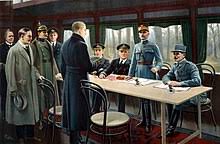 The exact moment of the signing of the Armistice by the Allies and the Germans was 11 minutes past 11 on 11 of November (the 11th month). The exact moment of the signing of the Armistice by the Allies and the Germans was 11 minutes past 11 on 11 of November (the 11th month).
In Germany “am elften Eften um elf Uhr elf” is the start of Fasching, a celebration of parades, open air concerts, dressing up and drinking and eating in public.
Signing of the Armistice, 11 November 1918 [Photo Wikipedia]
Me and Remembrance Day
I was involved in Remembrance Sunday from a young age. As a Cub Scout and then a Scout, my troop always turned out wearing our woggles, neckerchiefs and berets and proudly sporting the badges we had earned sown onto our tunics.
As an adult I would dress up in suit and tie and overcoat and scarf to attend church with my young family.
Me and Fasching
I’ve been in Germany for Fasching a handful of times. Two occasions stick in my mind.
The first was Stuttgart in 1972 whilst on my “Year Abroad”. Along I went, romantically unattached at the time, to an event in the city, where there were three female students from the same university as me (Salford) who were also working in the city.
Jac was the fiancé of my best friend Dan, so no chance there.
Jan was a very attractive redhead that I quite fancied, but I didn’t have a clue where to begin.
Brenda had been my girlfriend during the first part of our six months in Spain. Suddenly she dumped me unceremoniously for a local Spanish guy. I don’t think we have spoken since.
Not an evening I enjoyed very much, I have to say.
 The second Fasching of note was in Cologne in 2007, when I visited my daughter Amy who was on her year abroad from Oxford, where she was studying German and English Literature. The second Fasching of note was in Cologne in 2007, when I visited my daughter Amy who was on her year abroad from Oxford, where she was studying German and English Literature.
 We had a great time together. Quite by chance one of my favourite groups of the time, Londonbeat, was performing on one of the stages. It was great to see them live. We had a great time together. Quite by chance one of my favourite groups of the time, Londonbeat, was performing on one of the stages. It was great to see them live.
Amy, 20 years on Chief Exec.Tutors United [LinkedIn]
Londonbeat [Photo and audio courtesy of You Tube]
Amy and I shifted some beer that night, but we had a great time and no hangovers the next day.
Probably down to the strict Reinheitsgebot (German Purity Laws) which all beers must adhere to.
Endnote
I’ve not been to Fasching since. Oktoberfest, yes, but that’s another story for another day …..
© The History Man
Links:
Londonbeat - I've Been Thinking About You (Special Extended Mix)
LINDOR, Fúndete de placer – 6s - Londonbeat's 25 greatest hits
Acknowledgements:
LinkedIn
Royal British Legion
YouTube
Wikipedia
Tags:
11 November, 1918, Allies,“am elften Eften um elf Uhr elf”, Amy, Armistice, badges, berets, British and Commonwealth troops, Cologne, Cub Scout, English Literature, Fasching, First World War, German, German Purity Laws, Germany, Londonbeat, memorial service, minute’s silence, neckerchiefs, Oktoberfest, Oxford, Poppy Sunday, Reinheitsgebot, Remembrance Sunday, Salvation Army Poppy Appeal, Scout, Stuttgart, The History Man, Tutors United, woggle
 1
Like
Published at 6:03 PM Comments (0)
1
Like
Published at 6:03 PM Comments (0)
15 August – día festivo nacional
Thursday, August 15, 2024
Sí, señor, it’s yet another bank holiday in Spain. This time it’s an important religious one, Día de la Asunción, commemorating the ascent of the Virgin Mary, mother of Jesus Christ, into Heaven. it’s yet another bank holiday in Spain. This time it’s an important religious one, Día de la Asunción, commemorating the ascent of the Virgin Mary, mother of Jesus Christ, into Heaven.
Background
Whilst some d ías festivos are optional – it’s normally the comunidad autónoma, or region, that decides – 15 August is obligatory throughout the Spanish territory, ie the mainland; the two island groups, the Balearics and the Canary Islands; and the two enclaves in North Africa, Ceuta and Melilla. ías festivos are optional – it’s normally the comunidad autónoma, or region, that decides – 15 August is obligatory throughout the Spanish territory, ie the mainland; the two island groups, the Balearics and the Canary Islands; and the two enclaves in North Africa, Ceuta and Melilla.
15 August was established as Día de la Asunción by Pope Pius XII in 1950, the year I was born.
This year, 2024, 15 August falls on a Thursday. This means that many workers will take the Friday off as a “puente”, with the agreement of their employers, of course. This makes for a long weekend with many Spanish families going away for 3 or 4 nights, to the coast or to the mountains.
Días festivos nacionales still to come in 2024
12 October Día de la Hispanidad
1 November Todos los Santos (All Saints)
6 December Día de la Constitución
25 December Día de Navidad
© The History Man
Interesting reading:
Spain's forthcoming long 'bridge' holiday weekend - Secret Serrania de Ronda
Photos:
El Faro de Ceuta
SUR in English
Wikipedia
Tags:
1 November, 6 December, 12 October, 15 August, 25 December, All Saints, Balearics, bank holiday in Spain, Canary Islands, Ceuta, Día de la Asunción, Día de la Constitución, Día de la Hispanidad, Día de Navidad, día festivo, día festivo nacional, días festivos nacionales, El Faro de Ceuta, enclave, Heaven, Jesus Christ, Melilla, Pope Pius XII, puente, SUR in English, The History Man, Todos los Santos, Virgin Mary, Wikipedia
 1
Like
Published at 10:40 AM Comments (0)
1
Like
Published at 10:40 AM Comments (0)
Women political leaders
Thursday, August 8, 2024
 Some 36% of countries have had female heads of state or heads of government. Significant ones that come to mind are Margaret Thatcher, prime minister of the United Kingdom for 11 years; Angela Merkel, chancellor of Germany for 16 years; Golda Meir, prime minister of Israel for five years; Indira Ghandi, India, 15 years; Benazir Bhutto, Pakistan, five years; Corazon Aquino, Philippines, six years; Mary Robinson, president of Ireland, seven years; Julia Gillard, Australia, three years; and Cristina Fernandez de Kirchner, Argentina, 12 years. Some 36% of countries have had female heads of state or heads of government. Significant ones that come to mind are Margaret Thatcher, prime minister of the United Kingdom for 11 years; Angela Merkel, chancellor of Germany for 16 years; Golda Meir, prime minister of Israel for five years; Indira Ghandi, India, 15 years; Benazir Bhutto, Pakistan, five years; Corazon Aquino, Philippines, six years; Mary Robinson, president of Ireland, seven years; Julia Gillard, Australia, three years; and Cristina Fernandez de Kirchner, Argentina, 12 years.
 But none of these was the first. That honour goes to Sirimavo Bandaranaike who became prime minister of Ceylon, later Sri Lanka, in 1960. She took over from her husband who was assassinated. She served four terms, totalling 18 years. But none of these was the first. That honour goes to Sirimavo Bandaranaike who became prime minister of Ceylon, later Sri Lanka, in 1960. She took over from her husband who was assassinated. She served four terms, totalling 18 years.
Facts
36% of the world’s 195 nations, ie only about 70, have had a female head of government or head of state.
The first was Sirimavo Bandaranaike who was elected prime minister of Ceylon, later Sri Lanka, in 1960.
In 1980 Vigdís Finnbogadóttir of Iceland became the first woman in the world to be elected head of state in a national election.
Of the 10 most populous countries, the United States, Russia, China, Mexico, and Nigeria had never elected a woman leader, although Claudia Sheinbaum was recently elected president of Mexico, and Kamala Harris is surely poised to be elected the first female president of the United States in November 2024.
Significant women leaders in Europe
The Iron Lady - Margaret Thatcher
 Margaret “Mrs” Thatcher, daughter of a grocer, became leader of the Conservative and Unionist Party in 1975 and in 1979 she became the first ever woman prime minister of the United Kingdom. Margaret “Mrs” Thatcher, daughter of a grocer, became leader of the Conservative and Unionist Party in 1975 and in 1979 she became the first ever woman prime minister of the United Kingdom.
She survived her potential demise after one term by declaring war on Argentina when that country invaded the disputed Falkland Islands (Las Malvinas), which the South American republic claimed was theirs, and still does, despite the archipelago being British since 1833.
Thatcher dismantled the welfare state; privatised rail and bus companies, and energy providers, ie electricity, gas and water; and was anti-Europe, although the UK remained a member of the Common Market, the European Union’s name at that time.
Mrs Thatcher, the Iron Lady, was ousted by her own party in 1990, to be replaced as PM by John Major.
“Mutti” – Angela Merkel
 Angela Merkel grew up in the German Democratic Republic (East Germany). She was effectively an “Ossie”, yet she became the dominant politician in the re-united Germany, ruling as chancellor for 16 years, from 2005 to 2021. Angela Merkel grew up in the German Democratic Republic (East Germany). She was effectively an “Ossie”, yet she became the dominant politician in the re-united Germany, ruling as chancellor for 16 years, from 2005 to 2021.
"Mutti" Merkel presided over a strong economy, the Deutsche Wirtschaftswunder (German Economic Miracle), although in her later years, her policy of opening Germany’s borders to refugees fleeing from Africa and Eastern Europe has tarnished her legacy.
Both these women leaders were admired around the world, less so within their own countries.
The future
Who will be the next woman to have a major impact in Europe?
 Marine Le Pen, leader of the right-wing party National Rally (Rallye Nationale) in France appears to be a “busted flush”, after this summer’s general election, when in the second round of voting, the left and centre-left parties “ganged up on her”. Marine Le Pen, leader of the right-wing party National Rally (Rallye Nationale) in France appears to be a “busted flush”, after this summer’s general election, when in the second round of voting, the left and centre-left parties “ganged up on her”.
 Giorgia Meloni is an Italian politician who has been prime minister of Italy since October 2022, the first woman to hold this position. She has led the right-wing populist Brothers of Italy (Fratelli d'Italia - FdI) political party since 2014. Forbes magazine ranked Meloni as the fourth most powerful woman in the world in 2023. In 2024 she was listed among the most influential people in the world by Time magazine. Giorgia Meloni is an Italian politician who has been prime minister of Italy since October 2022, the first woman to hold this position. She has led the right-wing populist Brothers of Italy (Fratelli d'Italia - FdI) political party since 2014. Forbes magazine ranked Meloni as the fourth most powerful woman in the world in 2023. In 2024 she was listed among the most influential people in the world by Time magazine.
Gerardo Elorriaga, writing for Diario Sur on 28 July 2024, considered the above two women to be significant. Others he dismissed as largely irrelevant in terms of their likely impact on world politics.
He considered Thatcher and Merkel to have been massively important figures in European politics, and Indira Gandhi, Benazir Bhutto and Sheikh Hasina Wajed, in India, Pakistan and Bangladesh respectively.
  
Benazzir Bhutto Indira Gandhi Sheikh Hasina Wajed
Stop Press: In the wake of the current civil unrest in Bangladesh Sheikh Hasina Wajed has been forced to resign. Her place has been taken by Nobel Peace Prize laureate Muhammad Yunus, who heads an interim government.
Sources:
Diario Sur
Encyclopedia.com
New York Times
Wikipedia
Photographs:
Britannica
El Mundo
France24
Heroinas
Wikimujeres
Wikipedia
www.deutschland.de
Tags:
Angela Merkel, Benazir Bhutto, Britannica, Claudia Sheinbaum, Corazon Aquino, Cristina Fernández de Kirchner, Diario Sur, El Mundo, Encyclopedia, France24, Giorgia Meloni, Golda Meir, Heroinas, Indira Gandhi, Julia Gillard, Kamala Harris, Margaret Thatcher, Marine Le Pen, Mary Robinson, New York Times, Sheikh Hasina Wajed, Sirimavo Bandaranaike, Vigdís Finnbogadóttir, Wikimujeres, Wikipedia, www.deutschland.de
 0
Like
Published at 7:08 AM Comments (1)
0
Like
Published at 7:08 AM Comments (1)
Spam post or Abuse? Please let us know
|
|